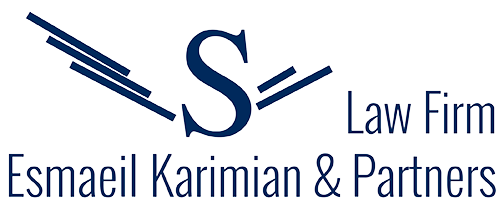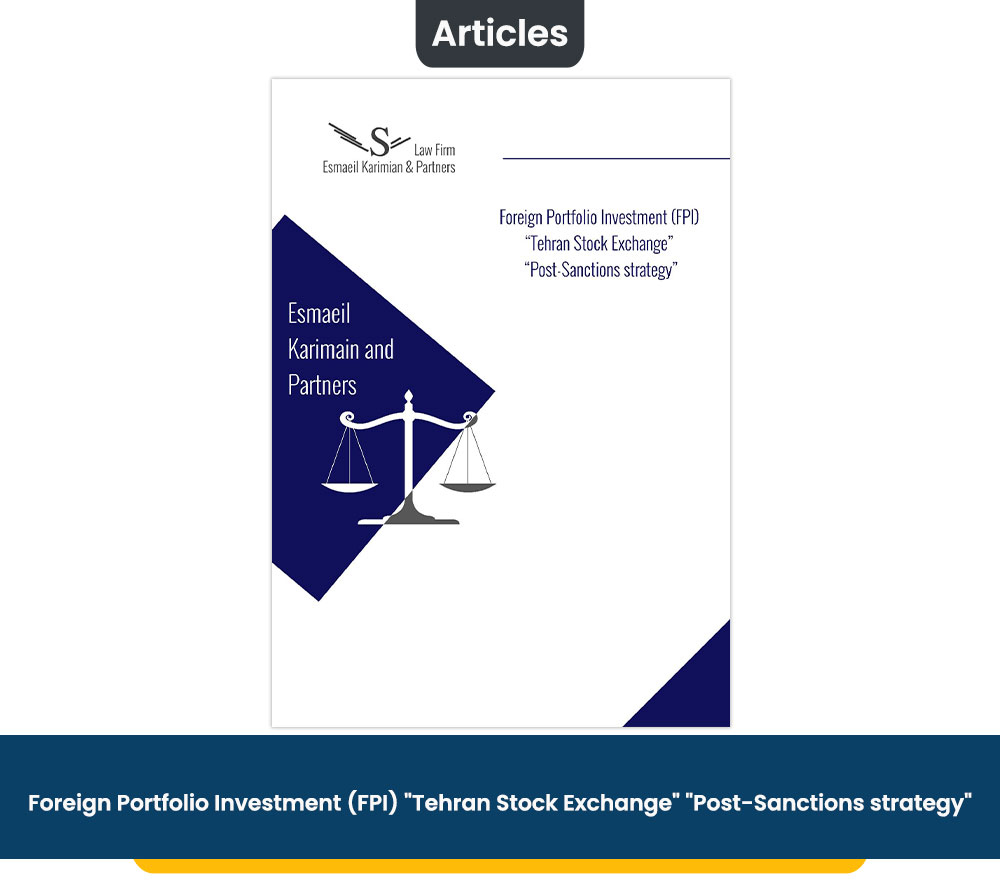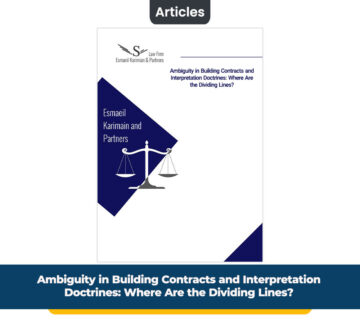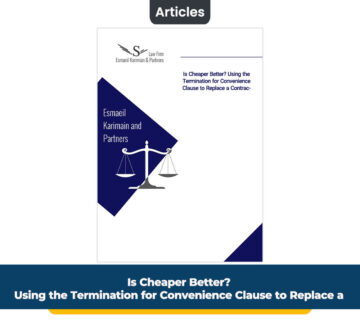In this article you will read:
Foreign Portfolio Investment (FPI)
“Tehran Stock Exchange”
“Post-Sanctions strategy”
Introduction
Tehran Stock Exchange was established in 1968, and has been the primary equities market in Iran. In 2005, the new Capital Market Law of Iran approved by parliament and in 2006, according to this Act, TSE was demutualized and established as a joint stock company with over 6000 shareholders. TSE has enjoyed a reputation for having maintained an orderly market and a cost- effective trading capability since its inception. The fully computerized trading system has helped boost the trading capacity and efficiency of the stock market. In 1994 electronic trading systems was launched. In 2007, TSE moved to the powerful trading system (powered by Atos Euronext) for meeting the high trading volume. TSE has been awarded quality system certificate of ISO9001; in 2009 and also planned to obtain ISO27001 certification for its IT Security Management System.
TSE has implemented many reform measures in the past few years in order to bring it in line with international practice, and to better reflect investors’ diversified needs. TSE is set to continue making progress towards liberalization and internationalization. The Tehran Stock Exchange, with its fully automated
trading systems and book entry mechanisms, is known as one of the most active exchanges in the Middle East region. At the end of June 201, the total market capitalization of the 342 companies listed on the Tehran Stock Exchange (TSE) amounted to US$105 billion. The ratio of total market capitalization to GDP was about 26 in 2010. In this year, the total trading value was US$19 billion, representing a market turnover rate of 22.5 . The market P/E ratio of the Tehran market was 6.7, lowest among primary WFE1 exchanges, making it an attractive marketplace for investors. In order to enhance the core competitiveness of the Tehran Stock Exchange and to make faster progress towards liberalization and internationalization, the authorities have also promoted the introduction of new financial products, new financial institutions and implemented many reform measures, such as the listing of Single Stock Futures (SSF), relaxing limitations on foreign investment, streamlining foreign registration procedures, and adjusting various trading system and mechanisms so that they are more in line with international standards.
1-Tehran Stock Exchange
As with several emerging stock markets, the Tehran Stock market historically set several limitations on foreign investment. With the growth of Iran’s stock market and development of the economy, the Stock market Authorities have gradually relaxed these limitations on foreign investors. Since April 2010, the process for investment by foreign investors in the stock markets has been changed from the ‘permit’ system to the ‘repatriation’ system. On 18th April 2010 Upon the recommendation of the Ministry of Economic Affairs and
Finance, and by virtue of the paragraph 3 of article 4 of the Securities Market Law of I.R.I ratified in 2005, the Council of Ministers approved “The Regulations Governing the Foreign Investment in the Exchanges and OTC Markets”. This has consequently simplified the application procedures for foreign investment in the Tehran Stock Exchange.
According to Article 7 of this “Regulations” the restrictions imposed on the
possession of shares by the non-strategic foreign investors on every exchange or OTC market are set forth as follows:
The number of shares owned by the total foreign investors shall not exceed twenty (20 ) percent of the total shares number of the companies listed on the exchange or on the OTC market or twenty percent (20 ) of the shares number of any company listed on the exchange or on the OTC market. The number of shares owned by each foreign investor in any companies listed on the exchange or on the OTC market shall not exceed ten percent (10 ) of the shares number of such companies.
Based on Article 4 the foreigners/ foreign entities shall have to submit the required information and documents to the Organization along with an application based on the forms prescribed by the Organization so as to obtain a license for trading in securities on every exchange or OTC market.
2. Buying and Selling Stocks
a) Choose a stockbroker.
In choosing a broker, you should check if that broker (person or corporation) is a member in good standing at the Tehran Stock
Exchange. A complete listing of the TSE member-brokers can be found in various publications or from the TSE Membership Department. It is important that you trust your broker and that you are satisfied with the services it provides for you. Brokerage services include market reports, advice regarding the stock selection and timing of purchases and sales, trade executions, on time delivery of important documents – such as confirmation receipts – and other trading- related activities that their clients may require.
b) Open a brokerage account.
Once the investor has chosen his brokerage firm, a brokerage account has to be opened. This account allows the client to perform stock transactions (buy and sell shares) any time – similar to a bank account which enables you to deposit, transfer and withdraw money. Opening a brokerage account is relatively easy to accomplish and takes no longer than opening a bank account. A specimen signature card needs to be filled out, containing the: name, address (professional and private), telephone number(s), and most importantly, the client’s signature. Frequently, bank and professional references have to be submitted.
Once an account has been opened, the client may buy or sell immediately according to the trading instructions between the investor and broker. Trading instruction can vary depending on the investors’ objective – whether it is short- term or long-term, minimum or maximum value of trades (trading limit), etc. All transactions are handled confidentially and the broker will not reveal to any person the details of any purchases or sales done for his client.
c) Place your order with your broker.
After opening the account, a trader will be assigned to the investor. A trader is a licensed salesman who is authorized to buy and sell securities at the TSE. The assigned trader will be your contact person for all the transactions. He/she will receive your order, most likely by telephone (unless arrangements are made), and will execute the order through the trading terminal connected to the main system of the Exchange. Thus, when placing an order to buy or sell, you have to call your trader and give the details of your order. The trader needs to know the following specifications: buy or sell order, which stock to buy or sell, the number of shares to buy or sell, and preferably also the bid price (when buying) or asked price (when selling).
d) Settle your transaction. Buying and selling transactions are settled by book-entry. This means the ownership of shares and cash is transferred electronically to the brokerage account, without the stock certificates and cash being handed over physically. The account is credited when buying shares, and debited in the case of selling shares. Tehran Stock Exchange is launching the paperless or scriptless trading that result to eliminating the physical handover of stock certificates when buying or selling. The system replaces the scrip- based system where stock certificates are handed over for transfer to the next owner. Instead, stock certificates are simply immobilized and kept in a safe place – Central Securities Depository of Iran, Inc. The book-entry system clearly advantages over the paper-based system. It has dramatically reduced paper work, facilitated the trading and eliminated the loss or forgery of shares. Currently the TSE settles trades on T+3, i.e., four days after the transaction date. Therefore, payments and/or securities must be delivered to your broker on trading day. Be sure to always verify the settlement deadline with your broker
for future transactions.
3. Global Relationship
TSE is the full member of WFE (Since 1992) and also a member and one of the founders of FEAS (Sincec1995) and also a subscriber of International corporate governance network (ICGN). TSE also is an active participant of OIC Members’ Stock Exchange Forum.
About ESK Law Firm
ESK Law Firm is one of Iranian leading law firms, with a reputation for standing out and for being outstanding. We provide legal services in areas such as international trade law; international investment law; banking and finance law; energy law; company law, litigation as well as conduct due diligence for entities, represent clients for negotiating, and designing and drafting various kinds of international contracts. Our clients include multinational corporations, businesses, entrepreneurs, financial institutions and governments who seek advice in respect to their domestic and international affairs, including cross-border transactions and inward and outward investment activities.
ESK Law Firm’s partners, with more than a decade experience in the legal services, provide professional services of substantial value to anyone who is presently managing, or considering development of local and international business operations. They offer the sharpest legal minds, the clearest advice, And an unshakable sense of what’s possible.





No comment